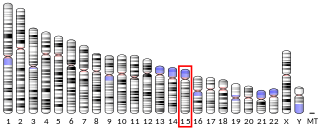
Carnitine is a quaternary ammonium compound involved in metabolism in most mammals, plants, and some bacteria. In support of energy metabolism, carnitine transports long-chain fatty acids from the cytosol into mitochondria to be oxidized for free energy production, and also participates in removing products of metabolism from cells. Given its key metabolic roles, carnitine is concentrated in tissues like skeletal and cardiac muscle that metabolize fatty acids as an energy source. Generally individuals, including strict vegetarians, synthesize enough L-carnitine in vivo.

Dilated cardiomyopathy (DCM) is a condition in which the heart becomes enlarged and cannot pump blood effectively. Symptoms vary from none to feeling tired, leg swelling, and shortness of breath. It may also result in chest pain or fainting. Complications can include heart failure, heart valve disease, or an irregular heartbeat.

Systemic primary carnitine deficiency (SPCD) is an inborn error of fatty acid transport caused by a defect in the transporter responsible for moving carnitine across the plasma membrane. Carnitine is an important amino acid for fatty acid metabolism. When carnitine cannot be transported into tissues, fatty acid oxidation is impaired, leading to a variety of symptoms such as chronic muscle weakness, cardiomyopathy, hypoglycemia and liver dysfunction. The specific transporter involved with SPCD is OCTN2, coded for by the SLC22A5 gene located on chromosome 5. SPCD is inherited in an autosomal recessive manner, with mutated alleles coming from both parents.
Glutaric acidemia type 1 (GA1) is an inherited disorder in which the body is unable to completely break down the amino acids lysine, hydroxylysine and tryptophan. Excessive levels of their intermediate breakdown products can accumulate and cause damage to the brain, but particularly the basal ganglia, which are regions that help regulate movement. GA1 causes secondary carnitine deficiency, as glutaric acid, like other organic acids, is detoxified by carnitine. Mental retardation may occur.

Trifunctional enzyme subunit alpha, mitochondrial also known as hydroxyacyl-CoA dehydrogenase/3-ketoacyl-CoA thiolase/enoyl-CoA hydratase, alpha subunit is a protein that in humans is encoded by the HADHA gene. Mutations in HADHA have been associated with trifunctional protein deficiency or long-chain 3-hydroxyacyl-coenzyme A dehydrogenase deficiency.

Carnitine O-palmitoyltransferase 2, mitochondrial is an enzyme that in humans is encoded by the CPT2 gene.

Thiamine transporter 1, also known as thiamine carrier 1 (TC1) or solute carrier family 19 member 2 (SLC19A2) is a protein that in humans is encoded by the SLC19A2 gene. SLC19A2 is a thiamine transporter. Mutations in this gene cause thiamine-responsive megaloblastic anemia syndrome (TRMA), which is an autosomal recessive disorder characterized by diabetes mellitus, megaloblastic anemia and sensorineural deafness.

Folate transporter 1 is a protein which in humans is encoded by the SLC19A1 gene.

The major facilitator superfamily (MFS) is a superfamily of membrane transport proteins that facilitate movement of small solutes across cell membranes in response to chemiosmotic gradients.

Solute carrier family 22, member 4, also known as SLC22A4, is a human gene; the encoded protein is known as the ergothioneine transporter.

Solute carrier organic anion transporter family member 1B1 is a protein that in humans is encoded by the SLCO1B1 gene. Pharmacogenomic research indicates that genetic variations in this gene are associated with response to simvastatin. Clinical guidelines exist that can guide dosing of simvastatin based on SLCO1B1 gene variant using genotyping or whole exome sequencing.

Solute carrier family 22 member 3 (SLC22A3) also known as the organic cation transporter 3 (OCT3) or extraneuronal monoamine transporter (EMT) is a protein that in humans is encoded by the SLC22A3 gene.

Solute carrier family 22, member 12, also known as SLC22A12 and URAT1, is a protein which in humans is encoded by the SLC22A12 gene.

Solute carrier organic anion transporter family member 1A2 is a protein that in humans is encoded by the SLCO1A2 gene.

Solute carrier organic anion transporter family member 2B1 also known as organic anion-transporting polypeptide 2B1 (OATP2B1) is a protein that in humans is encoded by the gene SLCO2B1.

Solute carrier organic anion transporter family member 4A1 is a protein that in humans is encoded by the SLCO4A1 gene.

Solute carrier organic anion transporter family member 3A1 is a protein that in humans is encoded by the SLCO3A1 gene.
Solute carrier family 22, member 21 is a protein that in the house mouse is encoded by the Slc22a21 gene. The gene is also known as Octn3 and Slc22a9. Slc22a21 belongs to a protein family of solute carriers.

Solute carrier organic anion transporter family member 2A1, also known as the prostaglandin transporter (PGT), is a protein that in humans is encoded by the SLCO2A1 gene.

Solute carrier family 13 (sodium-dependent citrate transporter), member 5 also known as the Na+/citrate cotransporter or mIndy is a protein that in humans is encoded by the SLC13A5 gene. It is the mammalian homolog of the fly Indy gene.



















